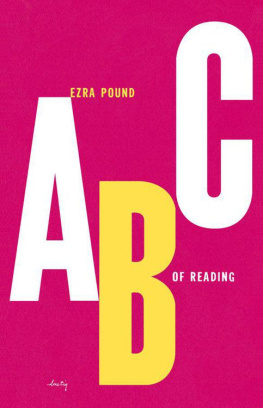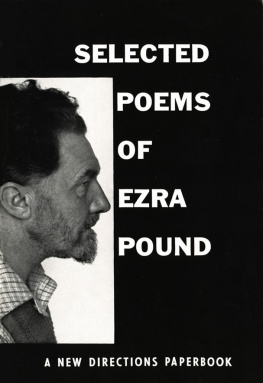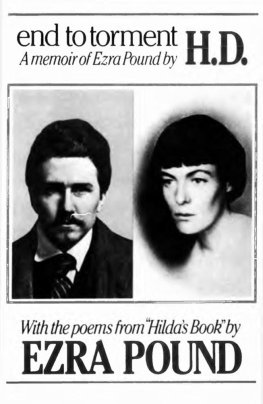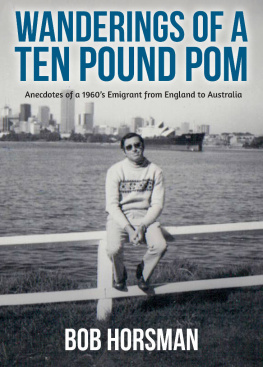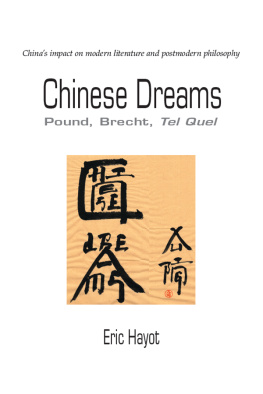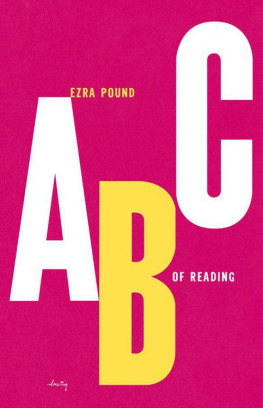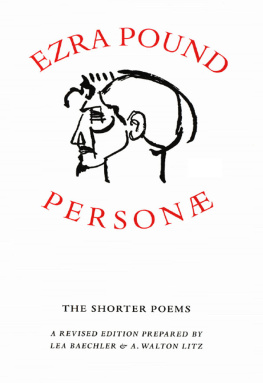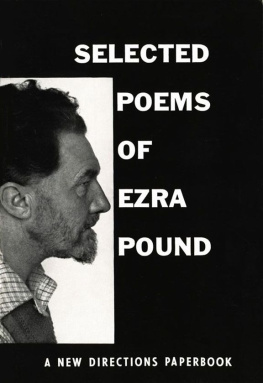Pound - ABC of Reading
Here you can read online Pound - ABC of Reading full text of the book (entire story) in english for free. Download pdf and epub, get meaning, cover and reviews about this ebook. City: New York, year: 2016;2010, publisher: New Directions Pub. Corp, genre: Detective and thriller. Description of the work, (preface) as well as reviews are available. Best literature library LitArk.com created for fans of good reading and offers a wide selection of genres:
Romance novel
Science fiction
Adventure
Detective
Science
History
Home and family
Prose
Art
Politics
Computer
Non-fiction
Religion
Business
Children
Humor
Choose a favorite category and find really read worthwhile books. Enjoy immersion in the world of imagination, feel the emotions of the characters or learn something new for yourself, make an fascinating discovery.
- Book:ABC of Reading
- Author:
- Publisher:New Directions Pub. Corp
- Genre:
- Year:2016;2010
- City:New York
- Rating:5 / 5
- Favourites:Add to favourites
- Your mark:
- 100
- 1
- 2
- 3
- 4
- 5
ABC of Reading: summary, description and annotation
We offer to read an annotation, description, summary or preface (depends on what the author of the book "ABC of Reading" wrote himself). If you haven't found the necessary information about the book — write in the comments, we will try to find it.
ABC of Reading — read online for free the complete book (whole text) full work
Below is the text of the book, divided by pages. System saving the place of the last page read, allows you to conveniently read the book "ABC of Reading" online for free, without having to search again every time where you left off. Put a bookmark, and you can go to the page where you finished reading at any time.
Font size:
Interval:
Bookmark:
by
EZRA POUND
INTRODUCTION BY MICHAEL DIRDA
A NEW DIRECTIONS PAPERBOOK
An introduction by Michael Dirda
Ezra Pound never took a single undergraduate course in English poetry. As a graduate student at the University of Pennsylvania he failed a class in the history of literary criticism. In the way of such things, it was probably inevitable that he should emerge as one of the twentieth centurys greatest poets and critics.
Pounds distinctive genius lay in his unbounded energy and exuberance. As the poet Donald Hall once observed, he combined accuracy of taste with energetic magnanimity. That magnanimity took myriad forms, from helping shape T. S. Eliots The Waste Land to passing along secondhand clothes to the impoverished James Joyce and, later on, persuading The Egoist to serialize A Portrait of the Artist as a Young Man.
Yet even while Pound was tirelessly calling for poets and novelists to make it new, he was also arguing for a return to origins, for a reexamination of Provenal lyrics, Renaissance translations, and the poetry of such underestimated figures as the Earl of Rochester and Walter Savage Landor. The only classics that truly mattered, he maintained, were those of the first intensity, those that broke fresh ground, invented or revealed new formal techniques, added a tool to the writers kit. As such, they provided the serious reader with needed axes of reference.
ABC of Reading is Pounds concise introduction to these touchstones or at least the European ones and it establishes what he would later call a set of measures, standards, voltometers. In fact, Pounds little book something of a literary equivalent to The Elements of Style gathers the artistic convictions and observations, his so-called gists and piths, from thirty years of personal and journalistic writing about literature.
In editorials for The Little Review, in Letters from Europe for The Dial, and in myriad essays for various other periodicals, the young Pound had both hammered out and proclaimed his esthetic principles. Like Nietzsche, Pound quickly mastered the aphoristic provocation: The history of art is the history of masterwork, not of failures, or mediocrity. The business of a critic is not to write huge tomes about this, that, and the other but to dig out the fine thing forgotten. In each age one or two men of genius find something, and express it. It may be in only a line or two lines, or in some quality of cadence; and thereafter two dozen, or two hundred, or two more thousand followers repeat and dilute and modify. All that the critic can do for the reader or audience or spectator is to focus his gaze or audition.
As such brilliant sloganeering shows, Pounds criticism is determinedly flamboyant and personal. Wyndham Lewis regarded his old friend, with some condescension, as half sensationalist, half impresario, half-poet. About the same time Gertrude Stein called him a village explainer. More accurately, Pound who in his early twenties was briefly a professor of Romance languages at Wabash College in Indiana never really stopped being a teacher. In later years he made himself into a one-man Ezuversity.
Open to virtually any page of Pounds critical writing or commentary, from 1910s Spirit of Romance, a study of medieval poetry, to 1964s anthology Confucius to Cummings, and you will hear his no-nonsense, pedagogical voice. Its so striking and memorable that one can hardly quote it enough: I have always wanted to write poetry that a grown man could read without groans of ennui. Literature is meant to relieve, refresh, revive the mind of the reader at reasonable intervals with some form of ecstasy, by some splendor of thought, some presentation of sheer beauty, some lightning turn of phrase. You are a fool to read classics because you are told to and not because you like them.
Again and again, Pound rightly stresses that art is a joyous thing and that we need a greater levity, a more befitting levity, in our study of the arts. Is it any surprise then that ABC of Reading might well be the most lively and provocative work of literary criticism ever written? As its author says on its opening page: Gloom and solemnity are entirely out of place in even the most rigorous study of an art originally intended to make glad the heart of man. Throughout the exhilarating first half of ABC one finds jokes, put-downs, ripostes, and shrewd remarks cloaked in humor: France may possibly have acquired the intellectual leadership of Europe when their academic period was cut down to 40 minutes.
In fact, when not sounding like the best literature professor you will ever have, Pound could almost pass for a modern-day blogger. He buttonholes the reader in a voice that is colloquial, brassy, and loud. He even writes in short paragraphs, like twitter messages or video sound bites. All his life Pound searched for a forum where he could broadcast to the world his ideas about poetry, the arts and society. He would have loved the internet. In attacking the clay icons of the literary establishment of his day Pound was even snarky, long before the word existed. He proudly admitted, I have never known anyone worth a damn who wasnt irascible.
Though sometimes a scourge, Pound was at his best as modernisms press agent or carnival barker: It is after all a grrrreat litttttterary PERIOD! A movement needs manifestos and polemics, publications with names like Blast and The Enemy, and labels, lots of labels Imagism, Vorticism that might attract media attention. When T. S. Eliot, in the dedication of The Waste Land, called Pound il miglior fabbro, the better maker, he may have spoken more shrewdly than he knew. Yes, Pound was a great maker, an old term for poet (cf. William Dunbars Lament for the Makers), and he did possess his eras most sensitive ear for the music of verse. But he was also a better macher, the Yiddish word for a deal-maker, the guy who knows how to make things happen.
Pound did this largely through hectoring personal communication. When James Laughlin, the future publisher of New Directions, visited the poet at his home in Rapallo, Italy, in 193435, Pound told him that postage was his greatest single expense. After all, he corresponded with people from around the world, sometimes advising W.H.D. Rouse on his translation of Homer or Laurence Binyon on his translation of Dante, sometimes assailing U.S. congressmen about economic reform. Nonetheless, as the 1930s advanced, Pounds already cracker-barrel epistolary style grew increasingly eccentric more and more pockmarked with abbreviations, odd spellings, nicknames, words in ALL CAPS, and almost incomprehensible allusions. Fat-Faced Frankie, for instance, was the Renaissance poet Francesco Petrarch. In effect, the poets idiosyncratic correspondence took on the appearance of extreme text-messaging.
By the late 1930s, alas, Pounds various intellectual passions overheated. He grew starry-eyed over Mussolini as a kind of Renaissance strong man, rabid about the cause of distributive economics and Social Credit, increasingly anti-Semitic, and generally loony about anything outside of art and poetry. The later installments of his masterwork, The Cantos, not only highlight his obsessions but also sink under increased hermeticism. His notorious anti-American radio talks during World War II often ranted incoherently, stymieing transcribers. Regarded as a traitor at wars end and locked up in a cage for three weeks during 1945, Pound finally suffered a complete psychological breakdown.
Instead of being imprisoned or shot (as he expected), the poet was committed to St. Elizabeth's mental hospital in Washington D.C. and lived there for twelve years, from 1946 to 1958. When Pound was finally released, following petitions from virtually every major American writer of his generation, as well as considerable secret string-pulling, the poet returned to Italy, worked desultorily on his later Cantos, grew increasingly depressed, then utterly silent. He came to wonder if his lifes work was a botch, finally repudiated his deluded politically based anti-Semitism, and only emerged from seclusion to visit the grave of James Joyce, attend the funeral of T. S. Eliot, and say goodbye to Marianne Moore and the failing William Carlos Williams. Pound himself died in 1972 at the age eighty-seven, and is buried in Venice.
Font size:
Interval:
Bookmark:
Similar books «ABC of Reading»
Look at similar books to ABC of Reading. We have selected literature similar in name and meaning in the hope of providing readers with more options to find new, interesting, not yet read works.
Discussion, reviews of the book ABC of Reading and just readers' own opinions. Leave your comments, write what you think about the work, its meaning or the main characters. Specify what exactly you liked and what you didn't like, and why you think so.

